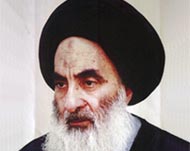Al-Sadr followers to boycott cabinet
Supporters of Iraqi Shia cleric Muqtada al-Sadr have announced they are suspending their membership of the cabinet in protest against an attack on their leader’s office in Najaf.

Twenty-one lawmakers and one Cabinet minister allied with al-Sadr will refuse to carry out duties indefinitely, al-Sadr ally Fattah al-Sheik said on Wednesday.
Transport Minister Salam al-Maliki confirmed the move and said he had suspended his membership in the Cabinet to protest the burning of al-Sadr’s office in Najaf.
The move could complicate efforts to convene parliament to vote on a new constitution and raises fears of internal conflicts among the Shia at a time when Sunni Arabs are outraged over the new draft constitution.
Earlier on Wednesday, clashes broke out in Najaf between supporters and opponents of al-Sadr, who led two uprisings against US forces in central and southern Iraq last year.
The clashes, which left at least four dead, broke out when al-Sadr’s group tried to reopen its office across the street from the Imam Ali Shrine (Prophet Muhammad’s cousin and son-in- law) which is sacred for all Muslims, but Shia consider it as a symbol for their sect.
The office was closed after confrontations in 2004 between al-Sadr’s Mahdi Army and US and Iraqi forces. Officials said al-Sadr’s opponents set fire to the office during Wednesday’s confrontation.
Aspiration
 |
|
Najaf is mostly inhabited by |
Najaf is mostly inhabited by Iraqi Shia followers of the Persian Shia cleric Ali al-Sistani who supports the US-backed Iraqi government and hold al-Sadr’s opposition to the US presence in Iraq as a hindrance to Shia aspirations.
The clashes enraged al-Sadr’s followers and prompted those in parliament and the cabinet to announce they would no longer carry out official duties until the Iraqi government punishes those responsible.
The incident is likely to fuel tensions between the Mahdi Army and the largest Shia party, the Supreme Council for the Islamic Revolution in Iraq, which holds al-Sistani as its spiritual leader.